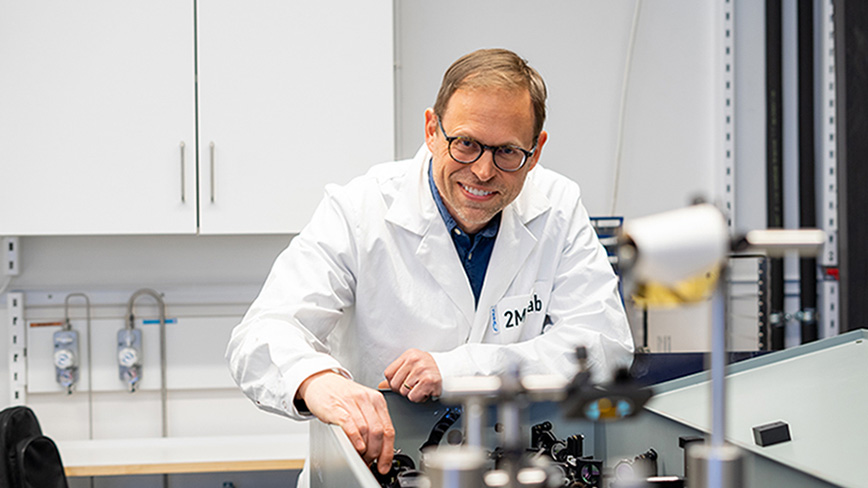"It's an incredible freedom to do what I find fun!"

He is fascinated by surface chemistry and dreams of spending more time in the lab. The microscope that makes it possible to study surfaces at the nano level was a turning point in the career of Magnus Johnson, new Professor of Surface and Corrosion Science.
Magnus Johnson was recently appointed Professor of Surface and Corrosion Science with a specialization in Surface Spectroscopy, which involves studying surfaces using electromagnetic radiation.
"It feels nice and almost a little surreal that what I worked for for many years has now become a reality," says Magnus.
His interest in surfaces started when he took a course in surface chemistry as an exchange student in the USA in the 1990s.
"What I find fascinating is that there are very few molecules on a surface compared to the rest of the material, yet the surface largely determines how a material interacts with its surroundings and reacts with different molecules," says Magnus.
Magnus is focused on basic research. He leads teams that, among other things, investigate how the natural material lignin can be used to protect metal surfaces against corrosion in a sustainable way.
"It is good if we can use lignin more, which is a residual product from the forest industry."
Turning point in the career
It was a big event when the German Neaspec Attocube instrument arrived in the lab in 2019. The infrared nanospectroscopy microscope can scan extremely small areas on surfaces. This means that the researchers can examine the local chemistry at a certain location on the surface. Magnus describes it as a turning point in his career:
"Since the chemistry on many surfaces changes over very small distances, it is a great advantage that we can now study the surfaces at the nano level. We are researching how corrosion occurs at the nano level and how we can use extremely thin organic films to protect metals," says Magnus.
The research team also investigates, for example, how individual particles of nanocellulose are structured and how different components such as phospholipids interact with each other and with water in models of cell membranes.
"What all these studies have in common is that we primarily use different types of vibrational spectroscopy which enable us to both study chemistry at the nano level and the very few molecules that sit at the very end of a surface. It is these few molecules that are so important for how a material is affected by the environment and it is something we can also influence by coating the surface with different types of molecules."
The instrument cost approximately six million kroner and was financed with a grant from Olle Engkvist's foundation. Companies are now turning to KTH for help in making detailed analyses. It provides both companies and researchers with new knowledge.
That the instrument came to KTH is thanks to Magnus. He spent half a year in 2017 at the Ludwig-Maximilian University in Munich to learn how the instrument worked from the inventor himself, Dr. Fritz Keilmann.
"In the meantime, I worked on getting grants so that we could buy the instrument and it worked!"
What do you appreciate most about your job?
"It's an incredible freedom to do what I find fun!" It is very stimulating to collaborate with many talented researchers. I also like to have contacts with the students, to teach and give them the best education possible."
As the person responsible for the engineering program Technical Chemistry at KTH, Magnus has recently worked to review the entire program and made a number of changes.
"Among other things, we have created a new course in electrochemistry. It is important because electricity is used more and more as an energy source, for example batteries in electric cars."
Likes high speed
Although Magnus appreciates the variety at work, time is a finite resource. In addition to leading the research work, he must also find time to seek funding for the work, write articles and give lectures.
"I dream of having more time in the lab," says Magnus.
In his spare time, Magnus likes to be active. He is an athletics coach and keeps fit by skiing, among other things. He has appreciated high speed since childhood, when he wanted to become a racing driver. Therefore, the time in Germany was also a positive experience privately:
"Munich was a fantastic city to stay in. We love to ski, the children learned to ski in the Alps. The half year there was a fantastic experience."
Text: Leena Höijer
